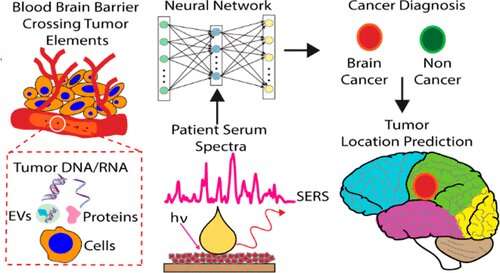Biosensor detects brain tumors with less than a drop of blood

Despite significant advances, mortality from brain tumors remains high with five-year survival rates of 36%, according to the National Cancer Institute. More accurate diagnoses might improve the situation, but tissue biopsies are invasive and can miss important information about a tumor's make-up. Imaging-based methods, meanwhile, do not offer sufficient sensitivity and resolution. Now, researchers reporting in ACS Nano have developed a biosensor that could help physicians precisely diagnose brain cancer from a minute blood sample.
To effectively treat brain cancer, physicians need to not only confirm the presence of a malignant tumor but also identify whether it originated there (primary tumor) or moved to the brain (secondary tumor) from other organs. Physicians also need to know where in the organ the tumor is located. Because no existing diagnostic technique can accomplish this feat without surgery or a painful spinal tap, Bo Tan and colleagues wanted to develop a noninvasive test using a tiny amount of serum.
The researchers used high-intensity laser beams to form 3D nickel-nickel oxide nanolayers on a nickel chip. This process resulted in an ultrasensitive biosensor that allowed them to detect minute amounts of tumor-derived materials, such as nucleic acids, proteins and lipids, that made it through the blood-brain-barrier into the circulation.
The sensor detected these components using a method known as surface-enhanced Raman spectroscopy, which generated molecular profiles, or fingerprints, for each sample. The researchers then analyzed these profiles with a DEEP neural network to find evidence of a brain tumor and define its type, as well as predict its location within the brain.
Using the liquid biopsy platform, the researchers could detect brain cancer from just five microliters of blood serum, and they could distinguish it from breast, lung and colorectal cancer with 100% specificity and sensitivity. They had similar success distinguishing primary brain tumors from secondary tumors that had metastasized to the brain from the lung or breast.
Profile analysis also allowed the researchers to determine in which of nine brain compartments the tumor resided with 96% accuracy. The noninvasive nature of the test should allow health care specialists to monitor cancer development over time so they can make better treatment decisions, the researchers say.
More information: Srilakshmi Premachandran et al, DEEP Surveillance of Brain Cancer Using Self-Functionalized 3D Nanoprobes for Noninvasive Liquid Biopsy, ACS Nano (2022). DOI: 10.1021/acsnano.2c04187



















